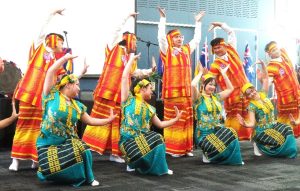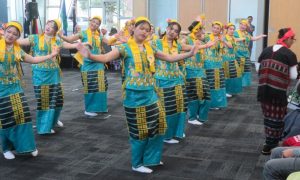Karen celebrates community and culture
Melbourne’s Karen community recently held a traditional wrist-tying cultural ceremony.
The event, at the Wyndham Civic Centre, included cultural performances, dance and traditional food.
More than a hundred people attended the ceremony, called ‘Lah Ku Kee Su’ or ‘Lar Khao Khang Su ‘in the Karen language, which is an ancient, annual cultural tradition, primarily performed in August to ensure community and individual well-being and unity.
During the ceremony, white and red threads are tied around wrists to bless and protect against misfortune and illness, symbolising the nurturing of community values like unity, respect, and forgiveness. 
It also serves as a reminder and reinforcement of Karen cultural identity, history, and values, often involving offerings like water, rice, bananas, flowers, and sugar cane to represent different virtues.
Local Karen community leader and Parks Victoria Ranger Thein Ju said the wrist-tying ceremony was a really important event in the Karen year.
“It brings Karen of all faiths together on a day to celebrate our culture,” Hsar said.
“The celebration stems from the very first migration of the Karen from Mongolia thousands of years ago.
“It’s also a significant cultural practice that helps pass down traditions and values to younger generations, fostering discipline, cultural preservation, and a sense of shared history.
“It’s part of our identity this is why it’s so important that we teach this to our youth, so they remember who they are.
“The ceremony reinforces the importance of unity, respect, forgiveness, and solidarity, binding the community together,” he said.
In the past, before religions like Buddhism and Christianity, Karen ancestors tied white threads on children’s wrists, believing it would keep their spirits close and protect them from harm.
The ceremony involves seven symbolic items: water for cleansing, rice balls for unity, sticky rice for sharpness, bananas for loyalty, flowers for resilience, and sugarcane for sweetness.
The ceremony, often led by an elderly couple, blesses the young, wishing them discipline, cultural preservation, and a life of harmony.
Karen community members from across Melbourne and other invited guests attended the ceremony, wearing Karen traditional clothes and celebrating it with Karen traditional “Done” dances and songs.
One of the invitees was Chief Ranger James Brincat from Parks Victoria, which runs programs for Karen refugees at Werribee Park.
“During the ceremony, the elders tie red and white string around our wrists and called on the good spirits to guide us. We were also treated to traditional dance, costume and ceremony and of course – food,” James said.
“There were many speeches, and it was incredibly touching to hear Parks Victoria recognised for the important role it plays for the local Karen community.
“In particular, for the work done with the Karen Aunties’ Garden and Pathways programs that have helped Karen youth; so much so that we now have two Karen speaking rangers.
“We’re excited to continue working alongside and supporting the Karen community, and we thank them for allowing us to participate in such a fantastic and moving ceremony,” he said.
Traditionally, the colourful festival take place in August at full moon. These days, the festival has also become a symbol of gathering and unity among the Karen people.













